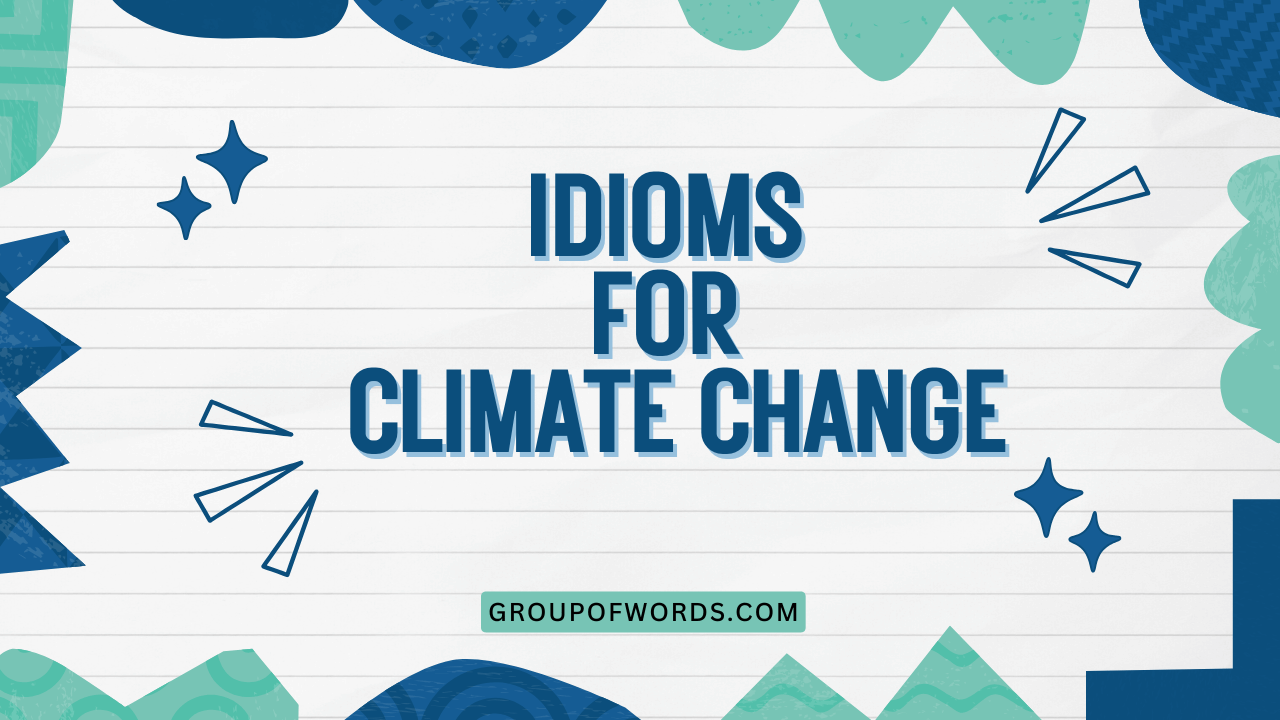Idioms for Climate Change: Understanding Figurative Language
Climate change is one of the most pressing issues of our time, and effective communication about it is crucial. While scientific data and statistics are essential, idioms offer a powerful way to convey complex ideas and emotions in a relatable and memorable manner.
Understanding idioms related to climate change enhances not only your comprehension of English but also your ability to discuss this critical topic with nuance and impact. This article will explore common idioms used in the context of climate change, providing definitions, examples, and practice exercises to help you master their usage.
This comprehensive guide is designed for English language learners, educators, journalists, and anyone interested in improving their communication skills related to environmental issues. By the end of this article, you will be able to recognize, understand, and use these idioms effectively in both spoken and written English, contributing to more informed and engaging conversations about climate change.
Table of Contents
- Introduction
- Definition of Idioms and Climate Change
- Structural Breakdown of Climate Change Idioms
- Types and Categories of Climate Change Idioms
- Examples of Climate Change Idioms
- Usage Rules for Climate Change Idioms
- Common Mistakes When Using Climate Change Idioms
- Practice Exercises
- Advanced Topics: Nuances and Regional Variations
- Frequently Asked Questions (FAQ)
- Conclusion
Definition of Idioms and Climate Change
An idiom is a phrase or expression whose meaning cannot be understood from the literal meanings of the individual words. Idioms are a fundamental part of the English language, adding color, depth, and cultural context to communication. They often convey complex ideas in a concise and memorable way.
Climate change, also known as global warming, refers to the long-term alteration of temperature and typical weather patterns in a place. It could refer to a particular location or the planet as a whole. Climate change is caused primarily by human activities, especially the burning of fossil fuels, which increases greenhouse gas levels in Earth’s atmosphere, raising the average global temperature.
When we combine these two concepts, idioms for climate change are phrases that use figurative language to discuss, describe, or comment on the various aspects of climate change, its causes, effects, and potential solutions. These idioms help to make the abstract and often overwhelming topic of climate change more accessible and relatable to a wider audience.
Structural Breakdown of Climate Change Idioms
Understanding the structure of idioms is crucial for their correct usage. Climate change idioms, like all idioms, often consist of a combination of words that, when taken literally, do not convey the intended meaning.
The structure can vary, but common patterns include:
- Verb + Preposition: “Turn a blind eye” (to ignore the problem).
- Noun + Verb: “Tipping point” (a critical threshold).
- Adjective + Noun: “Melting pot” (a place where things combine).
- Full Sentences: “We’re all in the same boat” (facing the same challenges).
The key is to recognize that the meaning is not derived from the individual words but from the phrase as a whole. Idioms often rely on metaphors, similes, and other figures of speech to create their unique meaning.
Types and Categories of Climate Change Idioms
Climate change idioms can be categorized based on their underlying figurative meaning and the aspect of climate change they address. Here are some key categories:
Metaphorical Idioms
These idioms use metaphors to draw parallels between climate change and unrelated concepts, making the abstract more concrete. For example, “a slippery slope” suggests that a seemingly minor action can lead to significant, negative consequences.
Proverbial Idioms
These are short, well-known sayings that offer general advice or wisdom related to climate change. For instance, “an ounce of prevention is worth a pound of cure” emphasizes the importance of proactive measures to mitigate climate change.
Descriptive Idioms
These idioms vividly describe the effects, causes, or potential outcomes of climate change. For example, “the writing is on the wall” indicates that the consequences of inaction are becoming increasingly clear.
Examples of Climate Change Idioms
To fully understand and use climate change idioms, it’s essential to examine specific examples within different contexts. The following sections provide a variety of idioms categorized by the specific aspect of climate change they relate to.
Environmental Impact Idioms
These idioms describe the effects of climate change on the environment, such as rising sea levels, extreme weather events, and loss of biodiversity.
The table below provides examples of idioms related to environmental impact, along with their meanings and example sentences.
| Idiom | Meaning | Example Sentence |
|---|---|---|
| Tip of the iceberg | A small, visible part of a much larger, hidden problem. | The recent heatwave is just the tip of the iceberg when it comes to the long-term effects of climate change. |
| Weather the storm | To survive a difficult period. | Coastal communities are struggling to weather the storm of rising sea levels and increased flooding. |
| Between a rock and a hard place | Faced with two equally difficult choices. | Governments are between a rock and a hard place, needing to balance economic growth with environmental protection. |
| A drop in the ocean | A very small amount compared to what is needed. | Individual efforts to reduce carbon emissions are just a drop in the ocean unless governments take significant action. |
| Turn over a new leaf | To make a fresh start and change one’s behavior. | If industries turn over a new leaf and adopt sustainable practices, we can mitigate the worst effects of pollution. |
| Make waves | To cause a disturbance or create a strong reaction. | The environmental activists are trying to make waves with their protests against deforestation. |
| As clear as mud | Very unclear or confusing. | The scientific reports on the long-term impact are as clear as mud, making it hard for policymakers to decide. |
| Go against the grain | To act or think contrary to the prevailing opinion or trend. | The company decided to go against the grain and invest in renewable energy despite the higher initial costs. |
| Barking up the wrong tree | Pursuing a mistaken or misguided course of action. | If we focus solely on recycling without addressing industrial emissions, we’re barking up the wrong tree. |
| Miss the forest for the trees | To focus on details and fail to see the bigger picture. | In discussing climate change, we often miss the forest for the trees by focusing on individual actions rather than systemic changes. |
| When it rains, it pours | When problems occur, they often come in rapid succession. | After the drought, when it rains, it pours, causing severe flooding and erosion. |
| Walking on thin ice | In a precarious or risky situation. | The government is walking on thin ice by delaying climate action, as the consequences will be severe. |
| Running around in circles | Engaging in activity that leads nowhere. | The international negotiations on climate agreements often feels like running around in circles. |
| Hit rock bottom | To reach the lowest possible point. | Some fear that the environmental damage will hit rock bottom if we don’t act quickly. |
| Down to earth | Practical and realistic. | We need down to earth solutions that are economically feasible. |
| Every cloud has a silver lining | There is something positive to be found even in difficult situations. | Even in the face of climate change, every cloud has a silver lining, as it fosters innovation in green technologies. |
| Grass is always greener on the other side | Other situations always seem more appealing than one’s own. | While some countries complain about climate policies, the grass is always greener on the other side for those suffering the most. |
| Have your head in the clouds | To be unrealistic or impractical. | Those who deny climate change have their heads in the clouds and are ignoring the real dangers. |
| Make hay while the sun shines | To take advantage of an opportunity while it lasts. | We need to make hay while the sun shines and invest in renewable energy before it’s too late. |
| Out of the woods | Out of danger or difficulty. | We won’t be out of the woods until global emissions are drastically reduced. |
| A sea change | A significant shift or transformation. | There needs to be a sea change in attitudes towards sustainability. |
| The calm before the storm | A quiet or peaceful period before a time of trouble or intense activity. | The current lull in extreme weather events may just be the calm before the storm. |
| A snowball effect | A situation where one event leads to a series of similar events, often increasing in magnitude. | The melting of glaciers can create a snowball effect, leading to further warming and ice loss. |
Urgency Idioms
These idioms emphasize the need for immediate action to address climate change, highlighting the limited time available to prevent catastrophic consequences.
The table below provides examples of idioms related to urgency, along with their meanings and example sentences.
| Idiom | Meaning | Example Sentence |
|---|---|---|
| Against the clock | Rushing to meet a deadline or complete a task within a limited time. | Scientists are working against the clock to develop new technologies to capture carbon emissions. |
| The eleventh hour | The last possible moment. | We’re at the eleventh hour for taking meaningful action on climate change. |
| Burning the candle at both ends | Working excessively hard and exhausting oneself. | Activists are burning the candle at both ends to raise awareness about the climate crisis. |
| Time is running out | There is limited time remaining to take action. | Time is running out to prevent irreversible damage to the planet. |
| A race against time | A situation where success depends on acting quickly. | Combating climate change is a race against time. |
| On the back burner | Postponed or given low priority. | Climate action has been put on the back burner due to other political priorities. |
| Bury your head in the sand | To ignore or avoid a problem. | We can’t afford to bury our heads in the sand when it comes to climate change. |
| A wake-up call | An event that alerts someone to a danger or problem. | The recent extreme weather events should serve as a wake-up call for governments. |
| At a snail’s pace | Very slowly. | Progress on international climate agreements is moving at a snail’s pace. |
| The writing is on the wall | The signs of future problems are clear. | The writing is on the wall: we need to act now or face dire consequences. |
| Lose ground | To fall behind or lose an advantage. | If we delay action, we will continue to lose ground in the fight against climate change. |
| No time to lose | There is an urgent need to take action immediately. | There’s no time to lose in implementing renewable energy solutions. |
| Up against it | Facing great difficulties or challenges. | We are up against it in trying to meet the goals set in the Paris Agreement. |
| Behind the eight ball | In a difficult or disadvantageous position. | Developing nations are behind the eight ball when it comes to adapting to climate change. |
| Against all odds | Despite seemingly insurmountable obstacles. | Scientists are working against all odds to find effective solutions. |
| Drag your feet | To delay or be slow in doing something. | Governments cannot continue to drag their feet on climate action. |
| Get the ball rolling | To start something. | We need to get the ball rolling on implementing sustainable policies. |
| In the nick of time | Just before it is too late. | We managed to implement the conservation plan in the nick of time. |
| On borrowed time | Continuing to exist or function longer than expected. | The ecosystem is on borrowed time if we continue to pollute it. |
| Pushing the envelope | Exceeding the current limits or boundaries. | Technologists are pushing the envelope to develop innovative climate solutions. |
| Seize the day | To make the most of the present moment. | We need to seize the day and take bold action to combat climate change. |
| The clock is ticking | Time is passing quickly. | The clock is ticking, and we must act before it’s too late. |
Responsibility Idioms
These idioms address the question of who is responsible for addressing climate change, often highlighting the need for collective action and accountability.
The table below provides examples of idioms related to responsibility, along with their meanings and example sentences.
| Idiom | Meaning | Example Sentence |
|---|---|---|
| Pass the buck | To avoid responsibility by shifting it to someone else. | Governments can’t keep passing the buck on climate action; everyone needs to take responsibility. |
| In the same boat | Facing the same challenges or difficulties. | We’re all in the same boat when it comes to climate change, so we need to work together. |
| Foot the bill | To pay the cost of something. | Future generations will foot the bill for our inaction on climate change. |
| Clean up your act | To improve one’s behavior or performance. | Industries need to clean up their act and reduce their carbon emissions. |
| Take the heat | To face criticism or blame. | Politicians are taking the heat for failing to address climate change effectively. |
| Face the music | To accept the consequences of one’s actions. | Those who have contributed the most to climate change must face the music. |
| A hard pill to swallow | Something unpleasant but necessary to accept. | Accepting the need for drastic lifestyle changes is a hard pill to swallow, but it’s necessary. |
| Carry the torch | To continue a tradition or movement. | Young activists are carrying the torch for climate action. |
| Draw a line in the sand | To set a limit or boundary. | We need to draw a line in the sand and demand immediate action. |
| Hold someone accountable | To make someone responsible for their actions. | We must hold corporations accountable for their environmental impact. |
| Point the finger | To blame someone. | Instead of pointing the finger, we need to work together to find solutions. |
| Shoulder the burden | To bear responsibility. | Developed nations need to shoulder the burden of helping developing nations adapt to climate change. |
| Step up to the plate | To take action and assume responsibility. | It’s time for everyone to step up to the plate and do their part. |
| Take the bull by the horns | To confront a difficult situation directly. | We need to take the bull by the horns and tackle climate change head-on. |
| Under your watch | During your period of responsibility. | The environmental damage occurred under your watch. |
| Call the shots | To make the important decisions. | Those who call the shots need to prioritize sustainability. |
| Get your hands dirty | To become involved in practical work. | Solving the climate crisis requires us to get our hands dirty and implement real solutions. |
| Let someone off the hook | To release someone from a responsibility or obligation. | We can’t let corporations off the hook for their environmental damage. |
| Pass the torch | To hand over responsibility to the next generation. | We must pass the torch to the next generation to continue the fight against climate change. |
| Put your money where your mouth is | To support one’s claims with action or resources. | Companies need to put their money where their mouth is and invest in sustainable practices. |
| Take ownership | To accept responsibility for something. | We need to take ownership of our environmental impact. |
Action and Inaction Idioms
These idioms describe the actions (or lack thereof) taken to address climate change, highlighting the importance of proactive measures and the consequences of inaction.
The table below provides examples of idioms related to action and inaction, along with their meanings and example sentences.
| Idiom | Meaning | Example Sentence |
|---|---|---|
| Turn the tide | To reverse a negative trend. | Investing in renewable energy can help turn the tide on climate change. |
| Rock the boat | To disrupt a stable situation. | Environmental activists are willing to rock the boat to raise awareness. |
| Build bridges | To establish connections and understanding. | We need to build bridges between different countries to combat climate change effectively. |
| Close the door | To prevent something from happening. | Delaying action will close the door on a sustainable future. |
| Fan the flames | To worsen a situation. | Continuing to burn fossil fuels will only fan the flames of climate change. |
| Hold the line | To maintain a position or level. | We need to hold the line against further environmental degradation. |
| Jump on the bandwagon | To join a popular trend. | Many companies are jumping on the bandwagon of sustainable practices. |
| Keep your head above water | To manage to survive in difficult circumstances. | Coastal communities are struggling to keep their heads above water due to rising sea levels. |
| Let sleeping dogs lie | To avoid stirring up trouble. | We can’t let sleeping dogs lie when it comes to climate change. |
| Open Pandora’s box | To unleash unforeseen problems. | Ignoring climate change could open Pandora’s box of environmental disasters. |
| Play your cards right | To act wisely to achieve a favorable outcome. | If we play our cards right, we can transition to a sustainable economy. |
| Raise the bar | To set a higher standard. | We need to raise the bar for environmental regulations. |
| Sail through | To succeed easily. | We won’t sail through the climate crisis without significant effort. |
| Take a backseat | To take a less active role. | We can’t afford to take a backseat on climate action. |
| Under the radar | Without being noticed. | Many small-scale environmental initiatives are operating under the radar. |
| Back to square one | To start over from the beginning. | If the climate talks fail, we’ll be back to square one. |
| Cut corners | To do something poorly to save time or money. | We can’t afford to cut corners when it comes to environmental protection. |
| Go the extra mile | To do more than what is expected. | We need to go the extra mile to reduce our carbon footprint. |
| Leave no stone unturned | To search everywhere. | We must leave no stone unturned in our search for climate solutions. |
| Pull your weight | To do your fair share of work. | Everyone needs to pull their weight in addressing climate change. |
| Set the stage | To prepare for something to happen. | Investing in green technology will set the stage for a sustainable future. |
Future Consequences Idioms
These idioms describe the potential long-term consequences of climate change, often painting a bleak picture of the future if action is not taken.
The table below provides examples of idioms related to future consequences, along with their meanings and example sentences.
| Idiom | Meaning | Example Sentence |
|---|---|---|
| Pay the piper | To face the consequences of one’s actions. | Future generations will pay the piper for our environmental degradation. |
| A can of worms | A situation that is more complicated than it appears. | Ignoring climate change will open a can of worms that we won’t be able to close. |
| Cooked goose | A situation with no chance of success. | If we don’t act now, the planet will be a cooked goose. |
| Face the music | To accept the unpleasant consequences of one’s actions. | Eventually, we will all have to face the music and deal with the effects of climate change. |
| A fool’s paradise | A state of happiness based on false hopes. | Thinking that technology alone will solve climate change is living in a fool’s paradise. |
| Hang over your head | To be a threat in the future. | The threat of extreme weather events will continue to hang over our heads. |
| In the long run | Eventually, over a long period. | In the long run, sustainable practices will be more beneficial. |
| Kick the can down the road | To postpone dealing with a problem. | We can’t afford to kick the can down the road on climate action. |
| Live to regret | To feel sorry about something in the future. | We will live to regret our inaction on climate change. |
| On the horizon | Likely to happen in the future. | More extreme weather events are on the horizon. |
| Paint yourself into a corner | To create a situation where you have limited options. | By delaying action, we are painting ourselves into a corner. |
| Reap what you sow | To experience the consequences of your actions. | We will reap what we sow if we continue to damage the environment. |
| Sow the seeds of | To start something that will have consequences in the future. | Our actions today are sowing the seeds of environmental disaster or future prosperity. |
| The chickens come home to roost | The consequences of one’s actions will eventually be felt. | Eventually, the chickens will come home to roost, and we will face the consequences of our inaction. |
| Under the bridge | Something that has passed and cannot be changed. | The environmental damage that has already occurred is under the bridge, but we can prevent further harm. |
| Bite the bullet | To face a difficult situation with courage. | We need to bite the bullet and make tough decisions to address climate change. |
| Come home to roost | To have negative consequences return to affect you. | The effects of pollution will eventually come home to roost. |
| A recipe for disaster | A situation likely to lead to failure or negative outcomes. | Ignoring scientific warnings is a recipe for disaster. |
| Skating on thin ice | To be in a risky situation. | We are skating on thin ice with our current environmental policies. |
| Stare down the barrel | To face a dangerous situation. | We are staring down the barrel of climate catastrophe. |
Usage Rules for Climate Change Idioms
Using idioms correctly requires attention to context and nuance. Here are some key rules to follow:
- Understand the Meaning: Always ensure you fully understand the idiom’s meaning before using it. Misusing an idiom can lead to confusion or miscommunication.
- Consider the Audience: Be mindful of your audience’s familiarity with idioms. If you’re communicating with non-native speakers, it may be best to use idioms sparingly or explain them clearly.
- Maintain Consistency: Don’t mix idioms or change their wording. This can weaken their impact and make your communication unclear.
- Use Appropriately: Idioms are often informal, so use them in appropriate contexts. Avoid using them in formal academic writing unless you’re doing so intentionally for rhetorical effect.
Common Mistakes When Using Climate Change Idioms
Here are some common mistakes to avoid when using climate change idioms:
- Literal Interpretation: Interpreting an idiom literally instead of understanding its figurative meaning.
- Incorrect: “We need to clean up our act, so everyone should start washing more.”
- Correct: “We need to clean up our act by reducing our carbon emissions and adopting sustainable practices.”
- Misusing the Idiom: Using an idiom in the wrong context or with the wrong meaning.
- Incorrect: “The government is really making waves by ignoring climate change.” (Making waves means creating a stir, usually positive)
- Correct: “The government is really dropping the ball by ignoring climate change.”
- Mixing Idioms: Combining elements of two different idioms.
- Incorrect: “We need to nip it in the bud and face the music.”
- Correct: “We need to nip it in the bud.” OR “We need to face the music.”
Practice Exercises
Test your understanding of climate change idioms with these exercises.
Exercise 1: Fill in the Blanks
Complete the following sentences using appropriate idioms from the article.
| Question | Answer |
|---|---|
| 1. Ignoring the warnings about climate change is like __________. | burying your head in the sand |
| 2. If we don’t act quickly, we will __________. | pay the piper |
| 3. The effects of climate change are just the __________. | tip of the iceberg |
| 4. We are __________, trying to reduce emissions before it’s too late. | against the clock |
| 5. The government needs to __________ and take responsibility for its actions. | clean up its act |
| 6. Developing nations need help from developed nations to __________ of adapting to climate change. | shoulder the burden |
| 7. The environmental activists are trying to __________ with their protests. | make waves |
| 8. We are __________ if we think technology alone will solve the climate crisis. | living in a fool’s paradise |
| 9. It is __________ to think that climate change will not affect us. | having your head in the clouds |
| 10. We need to __________ and take bold action to combat climate change. | seize the day |
Exercise 2: Matching
Match the idioms with their meanings.
| Idiom | Meaning |
|---|---|
| 1. Turn the tide | a. To face the consequences of one’s actions |
| 2. Pass the buck | b. To disrupt a stable situation |
| 3. Rock the boat | c. To reverse a negative trend |
| 4. Face the music | d. The last possible moment |
| 5. The eleventh hour | e. To avoid responsibility by shifting it to someone else |
Answers: 1-c, 2-e, 3-b, 4-a, 5-d
Exercise 3: Multiple Choice
| Question | Options | Answer |
|---|---|---|
| 1. What does the idiom “a drop in the ocean” mean in the context of climate change? | a) A significant effort, b) A minor problem, c) An insignificant contribution | |
| 2. Which idiom suggests that time is running out to address climate change? | a) Bury your head in the sand, b) Time is running out, c) Pass the buck | |
| 3. What does “clean up your act” mean in the context of corporate environmental responsibility? | a) To start litter picking, b) To improve environmental performance, c) To deny any wrongdoing | |
| 4. If someone is “kicking the can down the road” on climate change, what are they doing? | a) Implementing immediate solutions, b) Postponing action, c) Ignoring the problem | |
| 5. What does the idiom “weather the storm” mean in the context of environmental challenges? | a) To cause a disturbance, b) To ignore the problem, c) To survive a difficult period |
Answers: (Will be provided later)
Advanced Topics: Nuances and Regional Variations
The use of idioms can vary significantly depending on regional dialects and cultural contexts. While the core meaning of an idiom remains consistent, its usage and interpretation can be influenced by local customs and colloquial expressions.
For example, an idiom commonly used in American English may not be as prevalent or understood in British English, and vice versa.
Moreover, the nuances of idioms can change over time, reflecting evolving social attitudes and cultural trends. Therefore, it’s essential to stay updated on the current usage of idioms and be aware of any regional variations that may affect their interpretation.
Consulting regional dictionaries, style guides, and language forums can provide valuable insights into the subtle differences in idiom usage across different English-speaking regions.
Frequently Asked Questions (FAQ)
Why are idioms important in discussing climate change?
Idioms make complex issues relatable, add emotional depth, and improve communication by using familiar figurative language.
How can I improve my understanding of climate change idioms?
Read widely, pay attention to context, and practice using idioms in your own conversations and writing.
Are there any risks in using idioms incorrectly?
Yes, misusing idioms can lead to confusion or miscommunication, so always ensure you understand their meaning and usage.
Can idioms help bridge the communication gap on climate change?
Yes, idioms can make scientific information more accessible and engaging for a broader audience, fostering better understanding and action.
Conclusion
Mastering idioms related to climate change is a valuable skill for anyone looking to communicate effectively on this critical issue. By understanding the meanings, usage rules, and common pitfalls of these idioms, you can enhance your comprehension of English and contribute to more engaging and impactful conversations about climate change.
Keep practicing, stay curious, and continue to explore the rich tapestry of figurative language to become a more confident and articulate communicator.






